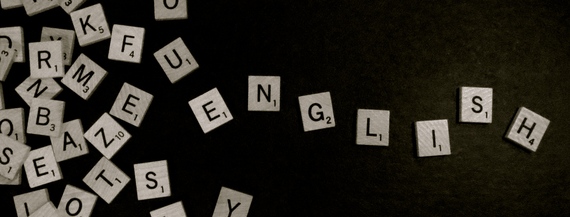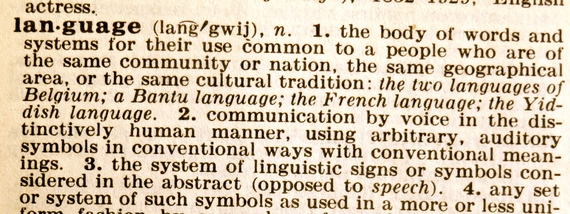
I'm part of the 1%. The 1% of people who don't know how to use emojis, that is. I'm that weirdo who uses correct punctuation in texts. I know and revel in the differences between except and accept, compliment and complement, and principal and principle. I memorized the spelling of pneumonoultramicroscopicsilicovolcanoconiosis when I was seven (bragging?). I've read voraciously ever since I learned how, and now that my writing isn't confined to a single, assigned topic and submitted to a professor for scrutiny in content and grammar, I adore writing. English, with all of its grammatical quirks and the endless possibilities for fun turns of phrase, is a fantastic language. Every language is special and worth learning in its own right, and even though I haven't yet gained expertise in any of the other languages that I've studied, my own personal love of language, an ESL certification, and two years teaching ESL around the world leave me qualified, in my opinion, to discuss English.
While language is first and foremost a means of communication, it's also a puzzle. I enjoy knowing the rules of English. From the basics of their/there/they're and your/you're to the more complex dangling participle, it excites me when these seemingly boring principles make sense and are correctly followed. It's only when we understand these rules that we can truly take advantages of all of the quirks of this language that make it so fascinating. For example, this grammatically correct sentence, in which two students, James and John, describe for their teacher a man who, in the past, suffered from a cold: "James, while John had had had, had had had had; had had had had a better effect on the teacher." It's a doozy of a sentence. But, it gets worse: look up the infamous "Buffalo sentence."
Still, I enjoy that language is a living entity, constantly changing in grammar and especially vocabulary. Shakespeare is the famous example of this: he's said to have invented over 1,700 new words. If we celebrate him for his creativity, how can we (ok, I) express disappointment with the Oxford Dictionaries for including, and thus validating, new words such as "whateves" and "chillax"? If we didn't allow English to evolve, we would hardly have words enough to express ourselves in our modern society, and we'd still be greeting each other by saying "Ēadig, þec tō mētenne."
More than 100 world languages have "language regulators;" academies intent on keeping the language "pure," or at least maintaining a standard variety of the language, such as standard German and standard French. This regulating body decides the "correct" spelling, pronunciation, and dictionary for its language. English has no such governing body. American English alone (I can't speak with any degree of certainty about other varieties of English) creates new words at an almost alarming rate. We inherently view English as a malleable entity, quickly changing nouns into verbs (have you ever told someone to "Google that" or said "I'm going to Skype"?), squishing two words together to make new ones (see the Oxford Dictionaries for new official words such as "bromance," "guyliner," and "humblebrag"), and pulling new words out of thin air that clearly serve a desperate need ("selfie"). Indeed, with the continuing emoji craze, it seems we've begun to transcend words entirely (or, perhaps we're regressing to the age of pictographs).
As for grammar, there are many "rules" (but how can they be rules if no one regulates them?) that, when followed, simply make sentences and phrases sound archaic today. Have you ever been told not to end a sentence with a preposition? That's the sort of correct grammar that can turn a casual question, such as "Who are you writing to?" into the Downton Abbey-esque query: "To whom are you writing?" Even Winston Churchill was said to scoff at overly pedantic grammarians. According to unverifiable Internet lore, a journalist once rearranged one of Churchill's own sentences to avoid ending it with a preposition, to which Churchill allegedly replied, "This is the sort of nonsense up with which I will not put," which we can all agree sounds fairly ridiculous. Maybe Captain Barbossa of Pirates of the Caribbean was secretly talking about grammar when he said the rules are really more what you'd call guidelines.
So, how does one balance a love of the structure of language with the acceptance of, and even delight in, how it changes over time? I found myself in just this situation when editing a previous blog post. I found a grammar mistake and ultimately chose to leave it in because I couldn't find a solution that sounded better or fit my meaning more accurately than the mistake itself. Even though it's technically wrong (although, again, who says?), it reflects current usage and, I believe, more precisely conveys what I was trying to express than any other wording could. It was an imperfect solution because I've been left with the nagging knowledge that I published something that would have been struck out with red pen by a certain college professor, but maybe I'm now part of the growth of the English language, akin to Shakespeare himself (ok, I won't go that far). While I can't promise there will never be a grammar mistake in my writing, I solemnly swear that it won't be for lack of editing. And just occasionally, it might be intentional.



